GREENEVILLE – High school and collegiate participants in Tusculum University’s TRIO programs for underserved students touted the value and personal impact of these longstanding services during a special event Friday, Feb. 21.
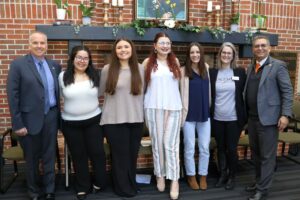
Speakers at Friday’s ceremony emphasized the value of Tusculum University’s TRIO programs. They are, left to right, Dr. David Smith, Guadalupe Flores, Gracie Monk, Janelle Zirger, Angela Masiello, Rachael Barnett and Dr. Scott Hummel.
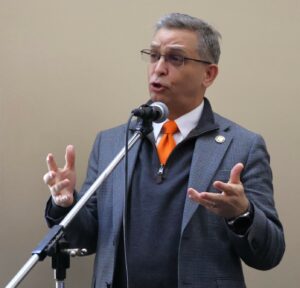
Dr. Scott Hummel highlights the value of Tusculum’s TRIO programs.
Tusculum observed TRIO Day, a national event, and used the occasion in the Scott M. Niswonger Commons to highlight the many positive program outcomes and achievements of alumni. Some TRIO alumni are helping serve the nation working at places such as Nuclear Fuel Services as a chemist and Y-12 National Security Complex as a nuclear engineer. They also contribute to the well-being of communities in a wide array of professions, such as teaching, law enforcement, nursing and research scientist.
“Our TRIO programs have some pretty impressive outcomes,” said Dr. Scott Hummel, Tusculum’s president. “When you look at the way they help students come to college prepared and then discover how graduation rates at a higher education institution are significantly greater for those who participate in TRIO programs than for those who are eligible but do not take advantage of those services, you see what a difference those programs make.”
Background of TRIO
TRIO programs serve students whose parents or guardians do not have a bachelor’s degree, who come from lower-income households and/or who have a disability. These programs are funded by federal grants. Attending Friday’s event were field representatives of U.S. Sens. Marsha Blackburn and Bill Hagerty and Congresswoman Diana Harshbarger. Rachael Barnett, director of Student Support Services, a Tusculum’s TRIO program, thanked them for their attendance.
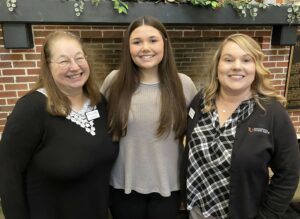
Gracie Monk, middle, a Talent Search participant, enjoys a moment with Terri Morgan, left, and Heather Tunnel, two staff members of that program.
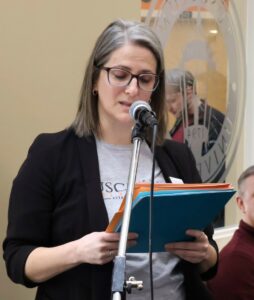
Rachael Barnett kicks off the event.
“TRIO’s continued success relies heavily on congressional support so we are particularly honored you all would spend today with us celebrating TRIO programs,” Barnett said. “Federal TRIO programs have been supporting first-generation, low-income students and opening the doors to educational access and opportunity nationally for 60 years. These programs build students into productive citizens and help to end generational poverty.”
Also present at Friday’s ceremony were representatives of TRIO programs at East Tennessee State University as well as Tusculum faculty, staff and students.
Tusculum provides seven TRIO programs – two each for Upward Bound, Talent Search and SSS and one for Upward Bound Math and Science. SSS, which includes the ARCHES program, serves Tusculum students, and the others assist pre-college students. Upward Bound was the first program at Tusculum, beginning in 1973.
In all, Tusculum serves more than 1,800 students in these programs. According to the most recently available statistics, at least 70 percent of high school senior participants in the pre-college programs were enrolled in or were accepted into college, and about 90% of participants achieved a grade point average of at least 2.5. For those participating in SSS and ARCHES as Tusculum students, the retention rate was 81%. Eighty-eight percent attained academic good standing, and 61% graduated within six years.
When one counts the other TRIO programs hosted by other institutions in Northeast Tennessee, the number of students served exceeds 6,000.
Students and alumni perspectives
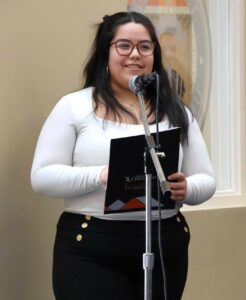
Guadalupe Flores highlights the positive impact of her years in Upward Bound.
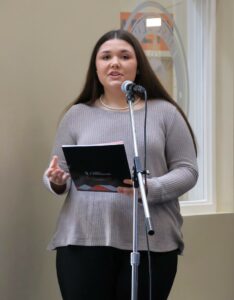
Gracie Monk shares her story about participating in Talent Search.
Gracie Monk is a senior at Chuckey-Doak High School who has participated in the Talent Search program for seven years. During the ceremony, she shared many highlights. They included her first tour of Tusculum in sixth grade, a Pirates Voyage trip, sports events, visits to memorial sites and a robotics camp. During the height of COVID-19, Talent Search provided a virtual painting class she really enjoyed.
“Talent Search is an excellent program, allowing students like myself to learn different skills that we will need for our future careers, colleges and life plans,” Monk said. “As someone who is striving for a career in the medical field, this program has allowed me to see different medical facilities that schools offer and know what I want in a school. Talent Search has shown me the importance of touring the schools that I am interested in and pushed me to do so. I have been blessed to be in such a program as this.”
Fellow Chuckey-Doak senior Guadalupe Flores has participated in Upward Bound since her freshman year. Her memories include a winter formal; science, technology, engineering and math trips; and the Summer Academy at Tusculum.
“All Upward Bound advisors have pushed me to continue improving myself even on the days where I don’t think I can keep going.,” Flores said. “In my life just in general, Upward Bound has been my support for the past four years. I have gained all these mentors and friends who know how to get the best version of me to come out. Now for my commitment to a post-secondary education, I have always known that I wanted to go to college. Upward Bound has been the push for me to go by providing academic support, college visits, workshops, mentorship, community and networking and personal development.”
Flores’ next step will be to attend Walters State Community College.
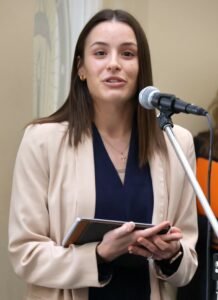
Angela Masiello discusses the impact of Student Support Services and the McNair Scholar Program on her.
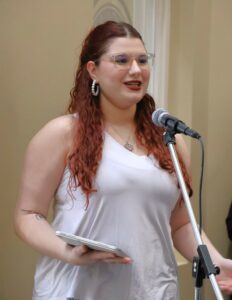
Janelle Zirger details her experiences in Student Support Services and the McNair Scholar Program.
Janelle Zirger is a junior at Tusculum, who comes from Jonesborough and is pursuing a degree in criminal justice and a minor in psychology with a long-term goal of earning a doctorate. She is a participant in SSS.
“From day one on this campus, I was welcomed and accepted by everyone, but even more so by SSS,” she said. “They completely understood my perspective of being a first-generation student and taught me that I am not alone in this feeling. Now, that doesn’t go to say that I didn’t have the support of my family and friends. I did. But to really understand something like this, you’d have to be one. You’d have to be able to help someone else understand and encourage them that they do not have to do this journey alone.”
In the summer, Zirger participated in the McNair Scholar program, a summer TRIO initiative, at ETSU. This is a research-oriented program, and Zirger spent eight weeks examining the criminal justice system, focusing on police. She has continued working with the McNair program since to further develop her research and has received guidance from Dr. Adam Denton, an associate professor of psychology at Tusculum. She has also made presentations on her research and has more coming, including at Tusculum’s Academic Symposium in May.
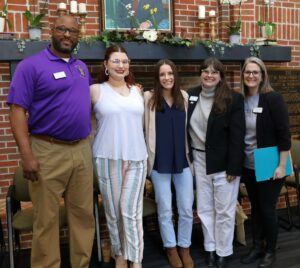
Left to right are Steve Anderson, Janelle Zirger, Angela Masiello, Meagan Stark and Rachael Barnett. Zirger is a present participant in Student Support Services, and Masiello is an alumna of it. Anderson, Stark and Barnett work in SSS.
One of the people who assisted her in the McNair program is Tusculum alumna Angela Masiello, who now pursuing her doctorate in experimental psychology at ETSU. Masiello also spoke during the ceremony.
Masiello participated in SSS and McNair during her Tusculum studies, and she said those programs were the launching pads to help her take off in her academic career. She said the McNair program was particularly helpful in giving her the tools to succeed in graduate school and research. She delved into psychological support and safety for college athletes with mentorship from a Tusculum professor as part of the McNair program and presented her findings at conferences in the region.
“I still apply all of the skills I learned through SSS and with McNair today,” Masiello said. “Currently, I have three publications under review, and I do give a lot of credit to the TRIO programs and services because graduate school is its own beast. Having that knowledge ahead of time of what graduate school really entails is very important for first-generation and low-income students.
“Until I ran into SSS and joined the program, I had no idea what I was doing with my life or what graduate school involved. But engaging with that program and being a part of McNair reshaped and reoriented my future, and I am so thankful for that.”
Administrative views
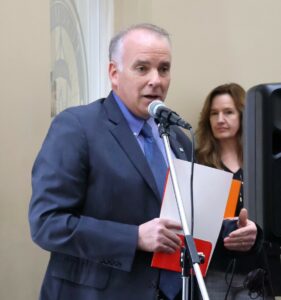
Dr. David Smith speaks during the ceremony.
“What you heard in listening to each of these students’ incredible stories emphasizes what’s so important about TRIO programs,” said Dr. David Smith, executive director of those programs at Tusculum. “National TRIO Day gives us an opportunity to reflect on the beautiful entity that is TRIO programs. Ultimately, it comes down to students because they are the talented individuals in development. We have the privilege of working with those individuals and nurturing that talent along so they have someone in their corner to help them achieve their goals.”
When Dr. Hummel examines TRIO programs from a financial perspective, he sees tremendous value.
“It takes federal investments in these TRIO programs for them to operate, but that is, by no means, just money spent on a program,” he said. “That is money spent on students and investing in them. The TRIO programs have generated a tremendous return on investment through academic opportunity and economic impact.”
Additional details about Tusculum’s TRIO programs are available at https://site.tusculum.edu/student-success/academic-affairs/first-gen/. More information about the university is available at www.tusculum.edu.


